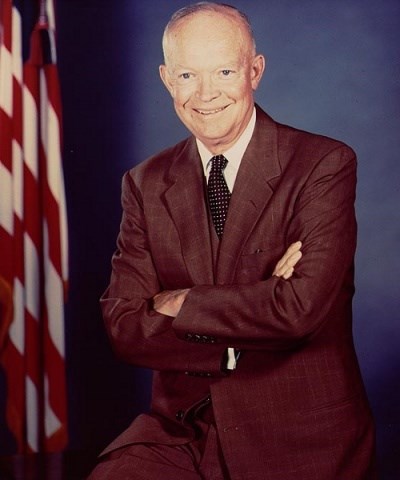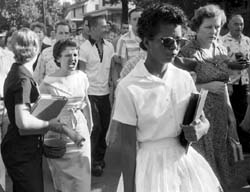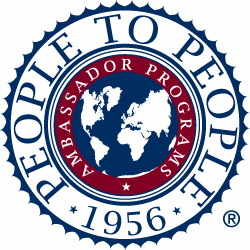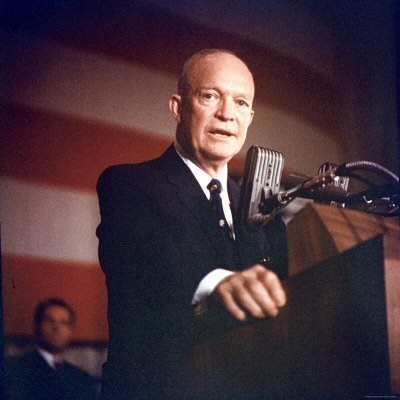 |
| President Eisenhower (http://www.thecuttingedgenews.com/index.php?article=31849&pageid=16&pagename=Opinion (n/a)) |
President Richard Nixon once said of Dwight D. Eisenhower, "Some men are considered great because they lead great armies or they lead powerful nations. For eight years now, Dwight Eisenhower has neither commanded an army nor led a nation; and yet he remained through his final days the world's most admired and respected man, truly the first citizen of the world." (Eisenhower Memorial). Nixon had a point. Eisenhower did not have the power or military might he possessed as the leader of our nation, yet people still admired him because of his character instead of his wealth or influence. However, this man had an extremely modest beginning. Through his diligence, he rose to become a greatly admired individual. Eisenhower was born on October 14, 1890 in Denison, Texas, but grew up in Abilene, Kansas, a small town. Eisenhower wasn't the best student, and preferred sports. Since he couldn't afford a college education, he decided to attend West Point, a military academy, where he received a free education. After West Point, Eisenhower became a second lieutenant, and then a captain during World War I. Eisenhower ascended the ranks in the military, eventually becoming a five star general. In World War II, he "defeated the greatest threat to peace the world had ever known." (NAPF). He was the leader of the invasion of Europe to liberate France and defeat the Nazis. After his successful career serving the country, he ran for president, and became the 34th president of the United States, serving two terms. Throughout his presidency, he improved international relations and tried to resolve the Cold War. He retired to a farm in Pennsylvania, and later, died from heart failure in Washington D.C. Eisenhower was buried in his hometown, Abilene, Kansas. He is considered one of the top 10 presidents of the United States. A true hero should possess integrity and be dedicated to his or her work. Dwight D. Eisenhower had these values. He was a five star general and a president, but what makes him a true deserving hero is not what he did with his power, but rather what he did with it; he exemplified integrity, leadership, and incredible dedication.
 |
| Student at Little Rock (nps.gov (Will Counts)) |
Throughout his career, Dwight D. Eisenhower demonstrated great integrity in his actions. An admirable example of this is his involvement in the integration of public schools. "...and the Justice Department made the case for integration in 1954 in Brown v. Topeka before the Warren Court, something Eisenhower regretted but did not prevent. The Court ordered the integration of the public schools with all deliberate speed, which Eisenhower thought was a terrible mistake because the schools were the most sensitive place to proceed, by far."(Ambrose). "Whatever one thought of Brown," he told (his childhood friend Swede) Hazlett, "I hold to the basic purpose. There must be respect for the Constitution-- which means the Supreme Court's interpretation of the Constitution-- or we shall have chaos.'"(Ambrose) Eisenhower followed the Supreme Court's ruling to integrate all public schools, even though he felt that this was a terrible mistake. He showed integrity when he went against his own strong feelings for segregation to support the Supreme Court's final decision. Furthermore, Eisenhower not only backed the choice to integrate verbally, but also defended it with his actions and his power. Orval Faubus of Arkansas defied a court order to integrate Central High in Little Rock. He called out the Arkansas National Guard and placed it around the high school, with orders to prevent the entry into the school of about a dozen Negro pupils...he[Eisenhower] called out the 101st Airborne and sent it to Little Rock. At Brownell's suggestion, he ordered the Arkansas National Guard into federal service, thus stealing Faubus's army out from under him and putting it to duty helping the 101st ensure an orderly and peaceful integration of Central High." (Ambrose) The governor of Arkansas did not agree with the ruling and misused his power by using the National Guard to prevent the integration. Eisenhower was known to sympathize with the Southern whites, but he sent his own troops and reassigned the National Guard to protect the African American pupils. Despite his own conflicting feelings, Mr. Eisenhower assigned his army to Arkansas. He showed integrity by doing what the Supreme Court ordered, not what he felt was right. Dwight D. Eisenhower was a man of integrity, standing by the rules instead of his own judgment and using his power for the right causes.
Eisenhower is the true definition of leadership. Not only did he just lead, but also had responsibility for his decisions and used diplomacy. This sets him apart from other leaders who only led. Eisenhower was responsible for all his decisions as a leader. He had to make high-risk choices that put lives at stake while under enormous amounts of pressure. When his choices were not the best one, he took responsibility for them. The consequences of this decision became apparent later on during the Cold War, the decades-long standoff between the United States and the Soviet Union. But such mistakes did not diminish Eisenhower's contribution to changing the course of the war in Europe and bringing it to an end." Contemporary Heroes and Heroines Even being criticized for some of his decisions didn't stop Eisenhower from continuing to lead the country. He accepted that his choice might not have been the best one and kept moving forward. Also, Dwight D. Eisenhower showed remarkable diplomacy as a leader. He said, "Leadership is the art of getting someone else to do something you want done because he wants to do it" (Leadership With You). He also joked that, "You don't lead by hitting people over the head-that's assault, not leadership,". Mr. Eisenhower meant that an important part of leadership is diplomacy. He stressed the ability to persuade others to do what you want done. He preferred to talk things out rather than resorting to violence when resolving problems. Eisenhower was no ordinary leader. He possessed qualities other leaders lacked.
 |
| People to People logo (http://www.garagequest.com/ (People to People)) |
President Eisenhower was extremely dedicated to his work and values. Eisenhower stayed involved in the country's international affairs. In fact, he remained devoted even after his two terms as president were over. The Dwight Eisenhower Presidential Library and Museum writes, "In retirement he did not completely retreat from political life. As an Elder statesman he remained active in the Republican Party. Both Presidents Kennedy and Johnson solicited his advice on international problems."(Dwight D. Eisenhower Presidential Library and Museum). Eisenhower served the United States even after his presidency, advising other presidents on their problems. This shows great dedication to his country. From his work as a general to his presidency and post-presidency, Dwight D. Eisenhower devoted a lifetime of service for the United States. However, perhaps the thing he was most passionate about was promoting peace. "In 1956, then President Eisenhower created, People-to-People. This citizen ambassador program opened the doors of governments and the homes of private citizens to cultural exchange and international understanding in the belief that people play a significant role in keeping world peace." (NAPF) He created People-to-People to further increase peace publicly, with the people instead of the government. Eisenhower didn't only show dedication by using his power to prevent war, but also created programs to keep world peace. This proves the massive commitment he made to peace. He was so passionate, so dedicated that he went far beyond his job to achieve world peace. Mr. Eisenhower sacrificed much of his time to serve the United States. He went beyond his presidency, fighting for his beliefs.
 |
| Eisenhower giving a speech (historyandtheologyblog.blogspot.com (N/A)) |
Eisenhower had such a modest beginning, but through his diligence, became a hero. Eisenhower showed integrity, leadership, and dedication throughout his career. He followed what was right instead of what he believed or felt was correct. For example, he sent his troops to protect the students in Little Rock, Arkansas since it was the Supreme Court's ruling to integrate high schools. Mr. Eisenhower is an inspiration because of his dedication to his work and values. He sacrificed his time to make this world more peaceful, better place. Eisenhower once said, "Every gun that is made, every warship launched, every rocket fired, signifies in the final sense a theft from those who hunger and are not fed, those who are cold and are not clothed." Even though he was a general, his experiences in the army actually contributed to his drive for international peace. After he experienced World War II, he knew that such a nightmare could not and would not be repeated by the world in his lifetime. I believe that it is true dedication for him to work for peace outside of his presidency. Eisenhower is judged not by his raw accomplishments or power, but by his character. He is a true peace-making hero.
Works Cited
Ambrose, Stephen E. "Dwight David Eisenhower." American National Biography (2010):
1. Biography Reference Center. Web. 27 Mar. 2012.
Ambrose, Stephen. "Dwight D. Eisenhower." PBS. PBS. Web. 20 Apr. 2012.
"Dwight D. Eisenhower." Contemporary Heroes and Heroines. Vol. 4. Gale, 2000. Gale Biography In Context.
Web. 28 Mar. 2012.
Eisenhower Presidential Library and Museum." Eisenhower Presidential Library and Museum.
Dwight D. Eisenhower Presidential Library and Museum. Web. 20 Apr. 2012.
Frost, Bob. "Dwight D. Eisenhower: Doing What Needed To Be Done." Biography 3.6 (1999):
100. Biography Reference Center. Web. 28 Mar. 2012.
Goodman, John B. "NAPF Youth Outreach: Peace Heroes: Dwight David Eisenhower." Wagingpeace.org.
Nuclear Age Peace Foundation. Web. 25 Mar. 2012.
Thomas C., Reeves. "Eisenhower, Dwight D." Britannica Biographies (2011): 1. Biography Reference Center.
Web. 28 Mar. 2012.
Page created on 4/23/2012 12:00:00 AM
Last edited 11/11/2018 5:46:32 PM
